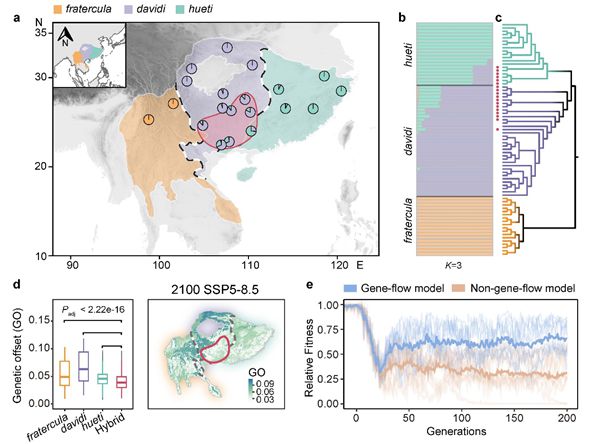Climate change is driving drastic environmental shifts and accelerating global biodiversity loss. Hybrid introgression has recently emerged as a key mechanism enabling rapid adaptation to historical climate change. Yet empirical evidence remains scarce on whether this process can enhance future climate resilience, particularly for narrow-ranged species in mountainous biodiversity hotspots.
To fill this knowledge gap, a research team led by Prof. QU Yanhua from the Institute of Zoology of the Chinese Academy of Sciences, focused on three closely related bird species in the Sino-Himalayan mountains: Alcippe hueti, A. davidi, and A. fratercula. By integrating population and ecological genomic approaches, the team found that interspecific introgression reduces climate change vulnerability in montane birds. Their findings were recently published in Nature Climate Change.
Genomic analysis revealed the three species began diverging approximately 220,000 years ago, with continuous gene flow among parapatric populations initiating around 47,000 years ago. Using machine learning, the researchers mapped introgressed genomic segments and their transfer directions. A. davidi and A. hueti exhibited more introgressed segments due to higher gene flow levels.
During divergence, the species carved out distinct climatic niches: eastern A. davidi thrives in warm, humid environments; western A. fratercula adapts to cool, dry conditions; and central A. hueti occupies an intermediate range. Despite these specializations, all three species are projected to face severe climatic challenges, potentially losing 44-69% of their suitable habitats.
Furthermore, the team discovered about 28.5% of climate-adaptive loci reside within introgressed genomic regions ((i.e., introgressed climate-associated SNPs) and show strong signals of natural selection. Hybrid individuals showed higher nucleotide diversity at these loci and required fewer genetic adjustments to cope with future climatic shifts, indicating lower climate vulnerability. Population genetic simulations reinforced these findings: under a continuous gene flow model, species fitness could recover within ~25 generations under future climate scenarios, whereas recovery was negligible without gene flow.
This study demonstrates that hybrid introgression is a crucial evolutionary mechanism enhancing species' capacity to adapt to climate change, the researchers noted. It also highlights the urgency of preserving migration corridors and contact zones, which are vital for facilitating interspecific genetic material exchange and restoring population fitness.

Interspecific introgression mitigates the climate change risk. (Image by QU Yanhua's Lab)






